I believe many people who are discussing or even devote their life into pro-Tibet, or anti-Tibet course haven’t been to Tibet themselves. Me included.
Tibet is a mysterious place for many people in China. People are amazed by the beauty of the land, the mysterious religious there. Going to Tibet was a serious fashion that many people in Shanghai dream about. I am pretty confident that Tibet is one of the top travel destination for many young people in Shanghai.
Although I have not been to the Xizang (Tibet) Autonomous Region – the provincial unit, but more widely speaking, it is a much bigger area where Tibetan live, including west part of Sichuan, and some parts in Gansu Province and Yunan Province.
I was lucky enough to planned a visit the Tibetan area in Sichuan Province, at the border of Xizang. I have posted many articles about the trip in my Daocheng category:
- Finally, My Daocheng Video is Online Jan 25, 2008
- Memorable Pictures Jul 16, 2004
- Daocheng Photos by Maphis Chen – Part III Jun 25, 2004
- Daocheng Photos by Maphis Chen – Part II Jun 25, 2004
- Daocheng Photos by Maphis Chen Jun 25, 2004
- Comments on My Daocheng Pictures Mar 14, 2003
- Going to Asia Mar 8, 2003
- Dream-like Tibet Mar 5, 2003
- Daocheng Video Online Jan 7, 2003
- Daocheng VCD Received Dec 9, 2002
- May God Bless Us Nov 27, 2002
- More Articles in Daocheng Nov 22, 2002
- Full Length Daocheng Video is Available Oct 25, 2002
- Send a Daocheng Greeting Card Oct 23, 2002
- Detailed Man-made Map for Daocheng Oct 19, 2002
- Altitude Sickness Prevention Guide Oct 17, 2002
- In Memorial of the Judge (Party III) Oct 16, 2002
- In Memorial of the Judge (Party II) Oct 15, 2002
- In Memory of The Judge Oct 14, 2002
- Small Daocheng, Small World Oct 13, 2002
- Where is Daocheng? Oct 12, 2002
- Stories of Daocheng Oct 11, 2002
- Escape from Shangrila Oct 10, 2002
- Daocheng Trip Schedule Oct 8, 2002
- Mountains and Snows in Daocheng Oct 7, 2002
- Returned from Dao Cheng Oct 6, 2002
- Message from Dao Cheng Oct 1, 2002
- I am on My Trip to Daocheng, the lost Shangrila Sep 28, 2002
Last time, I mainly focused on my trip (in the pure sense of travel) and the break-taking beauty of the land. Due to what is happening in Tibet these days, I am trying to search in my photo archive to find some photo related to the local culture and its people.
My Cultural Trip to Tibet Area
People in Tibet do believe in different thing than Han Chinese, and especially different from the modernized world. Look at the flag with religious articles on it (I don’t know the right word to describe it). Look at how small the characters are and how much time it take to create such a flag – it is everyone in the vast land where almost no people live there. They believe in spiritual things. They believe in something that we don’t believe at all.


My question is, from the spiritual signs everywhere, is it to early to conclude that they don’t want economic progress? I don’t think people who are not Tibetan cannot answer it, and even in the Tibetan group, there should be different point of view, just like it is silly to ask what "Chinese is thinking". I don’t know about the answer either. It really depends on when, and where you ask the question to whom…

This lady gave me deep impression during my visit to Riwa – a place on the way from Daocheng to Yading. He did nothing, and he used the Buddhist Necklace (this is the closest word I can find to describe what’s on her hand) and recite Buddhist Bibles all the time. She is very nice and kind.

Something to note in the picture below: the Hat! It is the style of hat of the People’s Liberation Army. When I talked to many of the
m, their memories of the outside world still keep like 1940s, when the PLA troop past their village. It seems after that, their door to the outside world was closed, until recently.
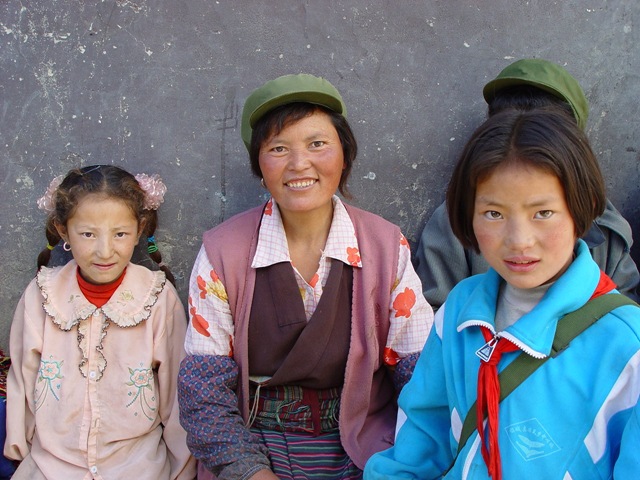
This is the whole group of people. When visitors and tourists busy taking pictures, and having dinners, they just gather there and chat.
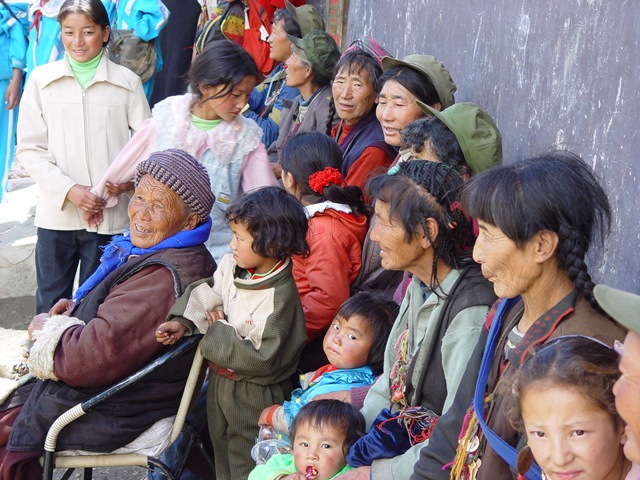
With the economic development with the tourist, they are very happen, and are very kind to tourists. They are all very nice people.

I love to interact with people. In the last visit, I talked with a Monk (with respect) in the temple. Look at how splendid his chair is. He was very kind and gave me the permission to take a phone of him.
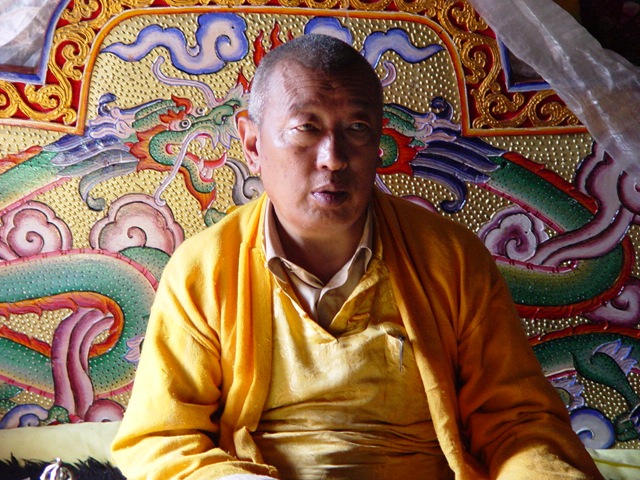
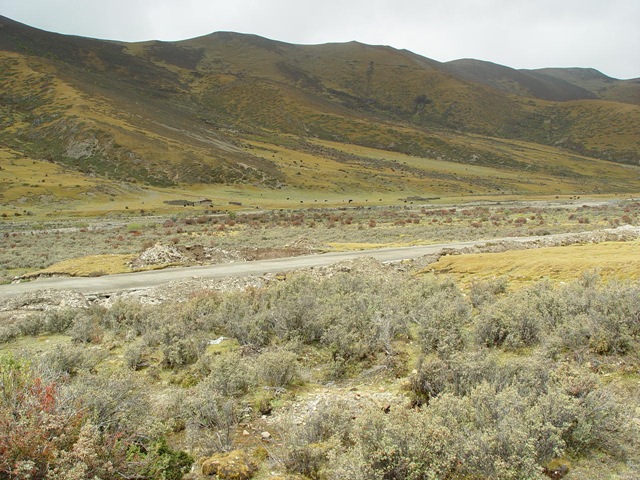
The land is lack of people – in the scene, you can identify some residential places, but people are really so small compared to the big nature.
Daocheng is already a relatively developed Tibet area even back to 2002 due to the boom of tourism. I heard they are even planning to build an airport (the highest in the world). I don’t know any news about the airport after my visit, but during my visit 6 years ago, I do see the electronic lines. They are equipped with electricity power – which is really a miracle when you see the vast majority of the land that barely have any people living there.
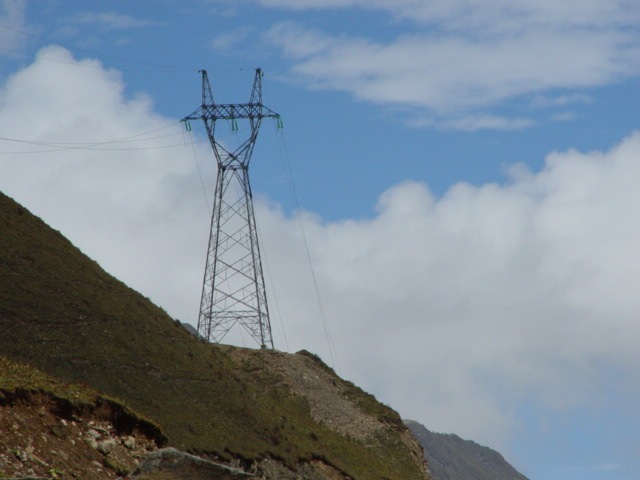
From the architecture point of view, Tibet is so unique that you don’t miss it. However, there is some sign of combined customs in this particular house – the Duilian, or couplet – the pink paper on the side of the door. This is, based on my knowledge, pretty new to the Tibetan culture. Unlike many places in China that culture mix is hard to find since the mix happens almost 1000 years ago (when different ethnics come to the same place due to war or conquer), Tibet still keeps its uniqueness, so fresh, and so solid.
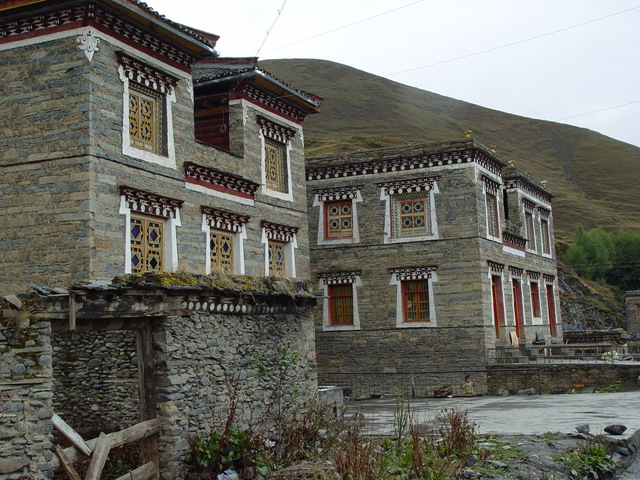
This is another scene of the mixture of architecture in Daocheng. Look at that building in the garden – it is a typical Han house.
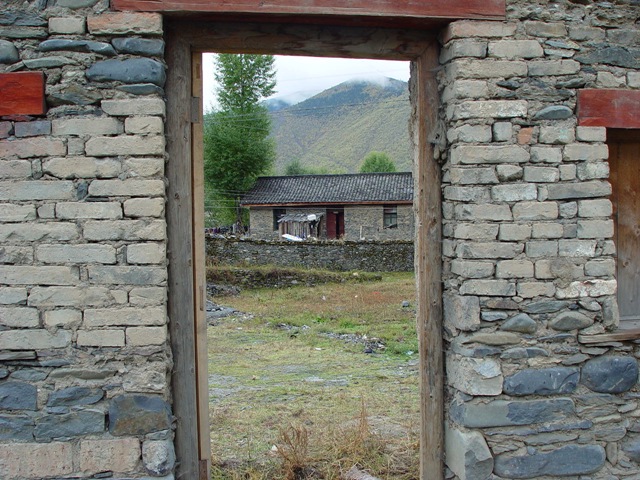
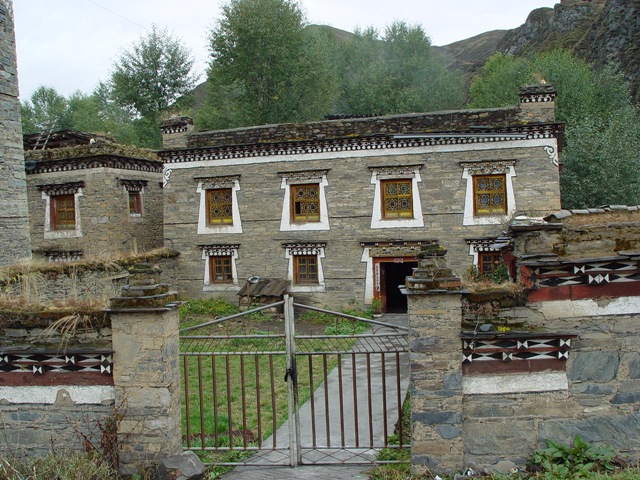
This is a normal morning in the area. Local Tibetan wear its traditional cloths and walked on the street – should I call it traditional? It should be the current daily dress for them, just like suits and T-shirt to people in most cities in the world.
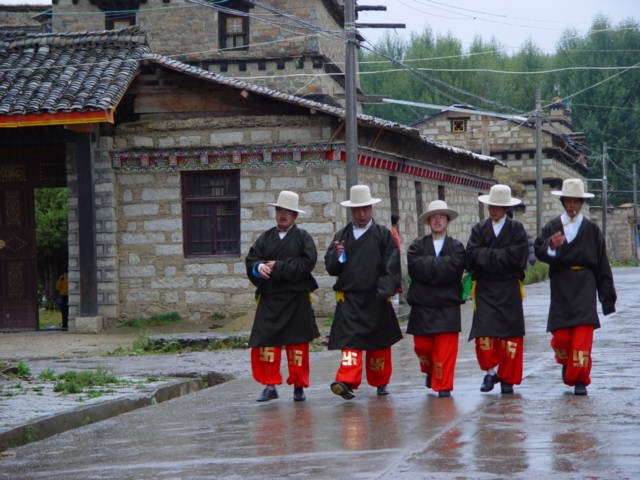
To me, I even don’t use the world different to describe my first impression of Tibet. It is not just different, it is unique! I cannot find the same feeling in any other places in the world yet – not in any city in China, nor countries in Southeast Asia, not to mention America, or Australia. I guess the comparable uniqueness feeling should exist in Middle East, or the Islamic area.
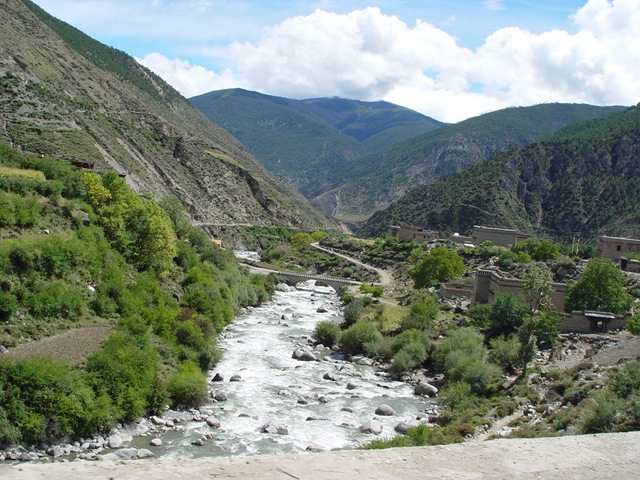
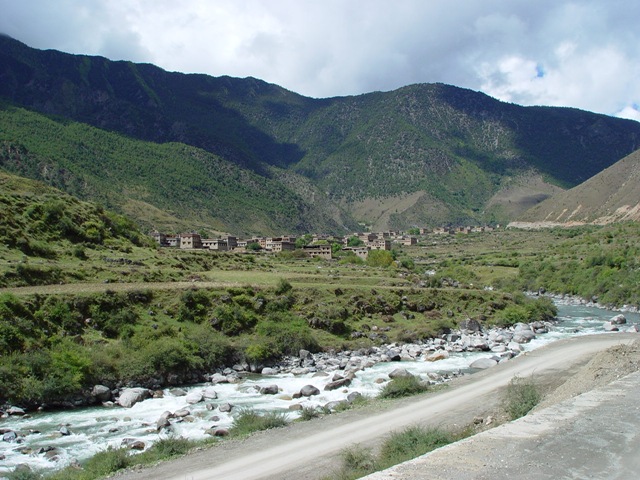
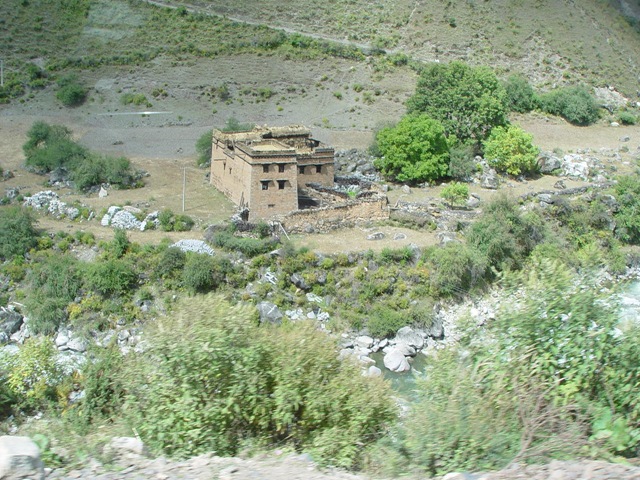
Tibetan are the miracle in this hash environment. Because the Tibetan Plateau is so high in altitude, most people coming from other part of the world may feel serious Altitude Sickness. We were seriously worried when our bus runs in the following condition for hours, with the risk of break down in the middle of the snow.

Religious signs are everywhere in the area. Look at the white stones found almost everywhere – not because of creation of nature, its because of tremendous effort by the Tibetan. They spent their whole lives to do religious things that I do not understand yet.

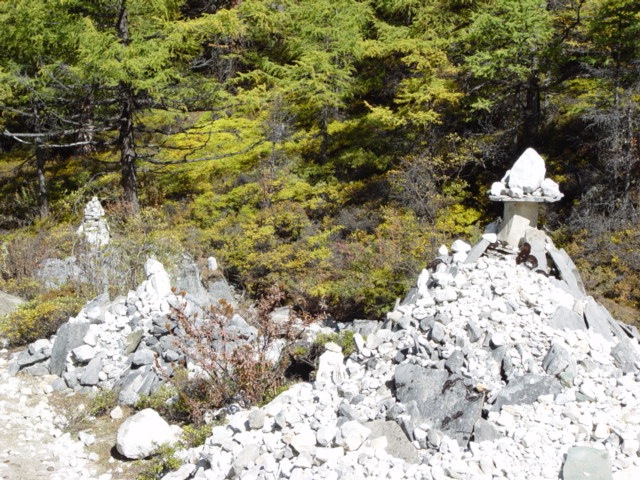
In many places, almost everywhere someone has ever been to before, there are some signs that I cannot tell the meaning. I am not to surprised with the stone in the wooden frame – pay attending to the bigger stone, and the smaller round one at the corner – stones were laid everywhere, in a way that only human can do. What does it mean? I said, it is everywhere.
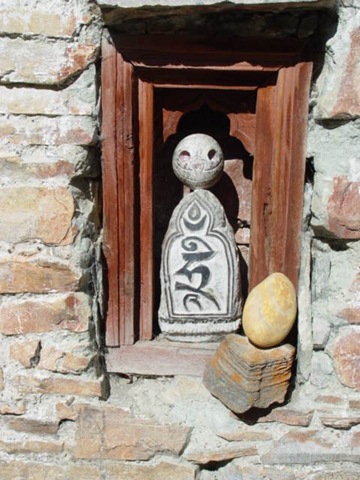
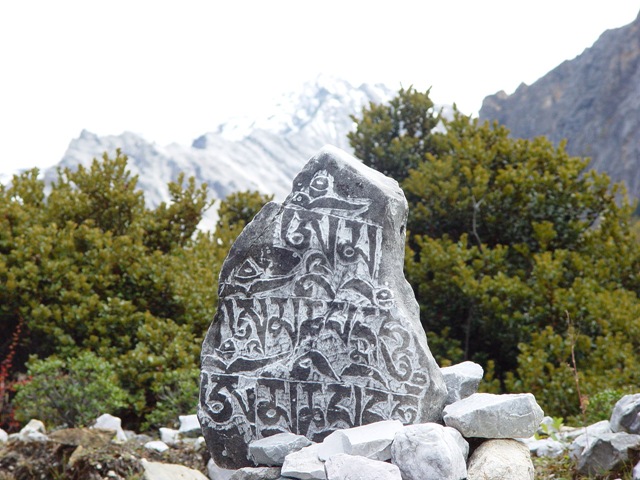
Along with the Tibet villages are some of the newly built buildings. It seems that the style is different, and similar to those found in other area of China. This Tibetan area is already the mixture of Han Chinese, and Tibetan. I have never been to the core Tibetan area, near Lhasa, or west of it. I GUESS, the mixture does not happen yet.
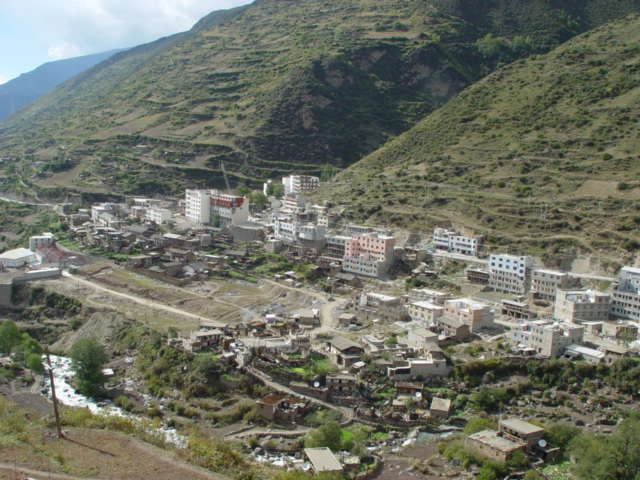
I totally agree with you – most people that argue about Tibet haven’t even been. Thank you for sharing such great photos. Gives us insight into the life and culture within.
Let’s ask the President and other leaders to make their attendance at the Games contingent on Beijing allowing the Dalai Lama to attend the Games. (He said he’d like to go.)
That would be a huge concession by China, it calls their bluff on whether the Olympics should be “above politics”, and it lets them make the decision. Plus, it’s a cleaner test that “talk to the D.L.” (which would end as soon as the Olympics are over). Post on this, with White House, Presidential candidates’, and Pelosi and Reid’s contact info:
http://www.huffingtonpost.com/m.s.-bellows/activism-you-can-do-send_b_96043.html
Well, the Dalai Lama hasn’t been to Tibet since before you were born — he is, in fact in Seattle where I am right now. There is far easier access to the senior lamas and rinpoches here in the west than anywhere else except perhaps India. So it would be incorrect to say that westerners are ignorant of the tibetan religion and culture. Especially since the tibetan religion and culture is essentially a puppet of the west.
I also think you do not relate to westerners when you say “They believe in spiritual things. They believe in something that we don’t believe at all.”. Modern Chinese are not very religious, and Confucianism is not technically a religion. So I can understand if Han Chinese feel this way. But the past 2,000 years of western culture were intensely spiritual. Westerners think it’s “modern” to profess that they have outgrown religion, but the vast majority come from a long line of religious people; and the west is still vast majority religious.
The religion of the Tibetans is very new — perhaps the newest of the modern religions; having been created in 1400AD by Karma Lingpa. It is a mish-mash of hinduism and buddhism; and a form of buddhism which itself was a mishmash of Christianity. So the religious views of Tibetans will seem in many parts familiar (if perverted and twisted) to actual buddhists, christians, or Hindus.
Regarding the idea that one must visit the ground that the religious dictator abandoned, I am reminded of that ancient debate between the Jews and Samaritans. The Samaritans were a sect of Jews who believed (based on the Torah) that God would only come to Mt. Gerezim. The Jews claimed that the contract had changed, and that God really resided in Jerusalem. The Jews economically dominated the Samaritans and essentially attempted “cultural genocide”. Of course, when Christ came along and said that God didn’t live in Jerusalem either, the Jews suffered economic marginalization for a thousand or more years. The point here is that the history of religion is littered with the bodies of people who claimed that you have to visit a particular piece of dirt in order to get the truth. Of course, such people still exist today — in fact there are 712 Samaritans still alive to this day, still clinging to their faith in a patch of dirt, and trying to avoid being culturally assimilated.
You also act as if there is a trade-off between spirituality and economic progress. There is certainly a tradeoff between spirituality and excess economic progress (greed, etc.); but has never been a tradeoff between prosperity and spirituality. People may not want to be rich, but everyone wants to be prosperous.
I think this issue solves itself when the current Dalai Lama dies. He has been raised and influenced by the west since he was a teenager, and is not capable of having his own thoughts. When he dies, there will be a battle to choose a new Dalai Lama, and this is opportunity to create a schism exactly as was done with the Catholic church in China.
Chinese people do have religion, which is called “Science”. Modern chinese people believe in science more than any other culture. We are respecting people’s beliefs in different religion, but you cannot disagree that religion was the reason causing so many killings between human beings.
Commenter Joshua obviously is confused, putting it kindly, about Tibetan history and religion. The blog authors pics and quotes are quite nice, it shows the distinctness of Tibetan culture and even the landscape.
It is not true that Chinese aren’t into religion, my wife is from the mainland and is quite religious, and so are many other Chinese I meet here in the USA that are recent immigrants from China. I’m sure many also don’t have strong religous beliefs, but like people everywhere else, it is their right to believe whatever they want. Worth noting is the fact that interest in Tibetan Buddhism is growing among some Chinese immigrants in America. I say this from my own personal observations.
I have also met Western visitors to Tibet, and some have been distressed at what they have seen. What people need to remember is that the current difficulties did not arise in a vacuum, nor are they a product of external manipulation, but they are a reflection of deep resentment across a wide spectrum of the Tibetan populace. Wiser leaders than those currently in control in Lhasa and Beijing would reflect on the true realities of the situation, and seek accomodation with the desires of the Tibetan people across historical Tibet (which, as the author suggests, an area considerably larger than “Xizang” and much closer to what all Tibetans consider their true homeland). This is the only way a just resolution which benefits both China and Tibet will happen, if iindeed it is not already too late. The standard harsh way of dealing with these issues will not work, just as it has not in the past 50 years, and will only increase distrust and distance between Tibetan and Han people.
“visitor”, I can tell that you are defensive about tibetan religion, but you need to challenge my facts with facts rather than ad-hominem hand-waving. I happen to know a great deal about the subject. What exactly do you find incorrect in my characterization of the modern religion of tibetan buddhism?
Yes, I was provocative by saying that it was invented in 1400AD, since claim is that 1400AD marked the time when the holy scripture of padmasambhava was discovered on the mountainside — and that this holy scripture was written in 800AD. Even if we grant that the book with the unique and ghoulish theology was written in 800AD, that is still newer than any other major religion. I cannot see how brainwashed westerners run around acting as if they have some ancient wisdom imparted from a scheme that is _at_best_ from 800AD. And in any case, no serious scholars would positively attribute the book’s authorship to 800AD.
The amount of textual criticism that has gone into Torah and other Canons of western religion is extremely rigorous, and the heads of the western religions are not afraid of having the provenence of their texts tested. In contrast, the claims of a pre-1400 creation for the book of the tibetans is exactly as believable as John Dee’s claims of accidentally finding ancient holy scriptures (subsequently “discovered” again by someone decades after his death — at least John Dee, operating in the same timeframe as Karma Lingpa, had the creativity to allow his cultic scripture to be discovered twice removed). The Vedas have undergone some textual criticism, but the Tibetan tradition comes from the (to be very kind) extremely sloppy tradition of Buddhism, where every random wise proverb in a village is eventually attributed to a mythical buddha. The scholarship is non-existant, and the doctrines varied wildly from geography to geography. At least the Armenians and others between east and west had the sense to collect their proverbs under an obviously fictional character.
Even Islam has had vastly superior honesty and integrity in scholarship of holy works that the buddhists and tibetans. Islamic scripture very early was polluted by many collected proverbs and stories of very questionable provenance (but none “found” on a mountain in the Himalayas, alas), but the descendants of the companions were men of integrity. They not only purged the questionable content to preserve the core of what was witnessed by multiple people (not a cult leader on a mountainside), but they committed to rigorous documentation of their beliefs over 1,000+ years. And they engaged on a rational level; even being the first to revive Aristotle. While Islam has recently been more resistant to such things, there have been important works of textual criticism of the Koran published in modern years.
It isn’t my intention to say that tibetan buddhism is inferior, but I find it ironic that a supporter of tibetan buddhism would be accusing me of being “confused” about the religion. Tibetan buddhism may be many things, but it is *not* a shining light of rationality or clarity — it relies on detatchment and sophism.
And I note that the supporter of tibetan buddhism is reciting directly from the “identity politics” playbook; pandering the same tired old pablum as if he is the sole person worth to speak on behalf of all tibetan people. How gigantic does a person’s ego have to be to lecture someone on a blog about “Here is what China must do to satisfy the tibetan people”? Does their god-king not teach them that we are all humans, all brothers? Why do they insist on driving wedges between people? Seriously, every time one of these people opens their mouth and has only hand-waving about some proverbs and then launches into a politcal tirade, the more I see why the Chinese government is concerned. They sure seem like a political movement to me.
We don’t tolerate religious cults who break the law in the U.S. either; most recent example is the FLDS sect in Texas who were breaking the law and trying to set up a separatist government. Funny, the FLDS trace their holy scriptures to a book that was “discovered” on a mountain, too. Just like in China, people in America are permitted to believe anything they want. But if they break the law, they pay the consequence.
Jianshuowang,
你好吗? 就是巨大荣誉,在您的网站发表意见!
Your pictures are gorgeous here, true eye candy. I’m impressed with the photographic skill on display here– the vantage points and the camera angles are very good work. I’m still a newbie amateur photographer so this is some inspiration for me!
On the Tibet topic– I work in the Public Relations field and in fact, as part of my company PR work, I’ve been to China myself and spoken with Chinese, Tibetans and quite a few other ethnicities. It’s my job to to offer suggestions to institutions on how to improve their image, and I’m offering some ideas here because I feel that overall, China and the Chinese people are being very unfairly criticized in the West lately.
In terms of my own views, I have some sympathy for both sides– I like the Tibetans and their fascinating culture, and feel it offers something to the world. (And for what it’s worth, most Tibetans I met in China had good relations with Chinese.) But at the same time, I have tremendous respect for Chinese people and your civilization, which is both ancient and quite advanced in modern terms– and with the way the USA and Europe are both driving ourselves to bankruptcy with short-sighted economic and foreign policies, I wonder sometimes if China may be the best hope for world civilization in the future, and advances in things like medicine, space exploration, mathematics and culture.
Above all, I’m just infuriated at many of my fellow Americans, Canadians, Australians and Europeans for attacking China in these torch protests and in the media. Honestly, most of us Americans, want to have good relations with China and work together with you for a better world, but a few loud, emotional, stupid protesters are polarizing opinion. The result is that Chinese people and Western people are made suspicious and mistrustful of each other. Please don’t think the protesters represent the majority of people in the West– most of us consider China a civilized and admirable society, a friend rather than an enemy and a country that has a lot of potential. In other words, most of us in the West just want to collaborate with Chinese and learn your language and culture, and here in the USA as well as in Europe, most Chinese and Western people have good relations with each other.
My own fiancée is herself Malaysian Chinese (I am a white, Germanic-looking American myself) and I speak Mandarin Chinese, so perhaps this also gives me a more favorable opinion of Chinese culture. But honestly, I like to think that my opinions here are fair-minded and rational– I can’t stand emotional idiots who offend people and make a problem worse. Many of the “Free Tibet” protesters in London, Paris and San Francisco, who even attacked a Chinese Paralympian in a wheelchair, have needlessly generated tensions on this issue.
Now, on to my own advice to you as a Public Relations professional. One of the guiding principles that people in the PR field use when offering advice to companies or governments, such as the Chinese government, is the so-called “neutral, reasonable, fair-minded observer standard.” In other words, when there is a conflict of ideas– say, between the Chinese government on the one hand, and critics of the Chinese government on the other hand– what would a reasonable observer on the outside, without a bias in either direction, conclude is fair and just?
This is a useful criterion, because it enables us in the PR field to discard criticisms of you that truly are stupid and unfair (such as the emotional vitriol of many of the Tibet protesters in London and San Francisco), while also offering suggestions for reasonable changes that can help your image. Some of these involve just presenting your side of the story, others involve some real changes that will help your image and, frankly, make things better within China.
I’m not giving these suggestions merely for cynical PR reasons– I really do believe that China is not being regarded in a fair way in the West, and I just want to encourage productive dialogue rather than all this antagonistic shouting and protesting in the West.
And also– this is very important– for China to truly become a leading nation in technology, business and science, it’s important to attract talented foreigners from Europe, North America, South America, Australia and the rest of Asia. Improving your image worldwide, and also making a few intelligent changes within, will help make China a much more attractive place.
A. First of all, take a look at these 5 videos. (I’m giving two links to each video, in case any particular link is removed):
http://www.youtube.com/watch?v=Fhx8jf3uaOc and http://www.youtube.com/watch?v=PCDmWLWMvY8
Also, http://www.youtube.com/watch?v=NDLfj8cKmc0 and http://www.dailymotion.com/video/x4ztb8_la-flamme-olympique-chahutee-a-pari_news
Thirdly, http://www.youtube.com/watch?v=9kzNWi5h8Hs and http://www.youtube.com/watch?v=twHzXN3kNTs
Fourth, http://youtube.com/watch?v=9GEW2tXV4Vw and http://youtube.com/watch?v=n90aNKGGGXQ
Fifth, http://youtube.com/watch?v=uSQnK5FcKas (just one copy of this one)
The first video is the most important– it shows an elderly, humble Tibetan man, in San Francisco, who is himself criticizing the “Free Tibet” protesters for their ignorance. He states what many of you have been saying– that prior to 1950, most Tibetans lived effectively as slaves or indentured laborers under the lamas. And he says that Tibetans are actually better off within China– that Tibetans have freedom of religion, are able to move throughout China, are free to work and not be enslaved, and are generally left alone.
In my job, we this video would be “a public relations dream,” because we have someone who is Tibetan himself, defending the Chinese nation and opposing the Tibetan activists and protesters. And again, using the “reasonable observer criterion,” this man does China’s image a lot of good. He shows what I and other more educated Westerners know ourselves– that China may not be perfect in Tibet, but that you grant the Tibetans many freedoms and are reasonable toward them.
The second and third videos are both designed to show the world that the Free Tibet protesters are not only emotional and unfair, but even arrogant and violent toward people that they disagree with, and even ignorant about Tibet itself. The second video shows the “Free Tibet” protesters in Paris, assaulting a Chinese girl in a wheelchair. She was protected by the French police who, fortunately, did their jobs well and fought off the arrogant protesters. But this shows how the Tibet protesters are hateful people themselves, and reduces their credibility. The third video does this even further– it’s an American reporter, in San Francisco, who simply asks the Tibet protesters to find Tibet on a map. Not a single one of them could do it.
The value of the second video, from a PR perspective, is that a fair-minded observer sees many of the Tibet protesters as being far from the sympathetic individuals they claim, but asinine enough to assault a woman in a wheelchair. The third video puts the very credibility of the “Free Tibet” movement into doubt, since it shows that the Tibet protesters don’t understand their own cause– they’re just “protesting for the sake of protesting.”
The fourth video may be the most valuable of all, as it shows the original riots– not peaceful protests– within Tibet, as filmed by an Australian tourist there. It puts the lie to the claims about peaceful protests reported in much of Western media, and shows that the “protests” were in fact violent riots, and that the police reacted proportionally.
The fifth and final video is a “sting operation” that uncovers a number of deliberate lies perpetrated in Western media. I know you talked about this before in another post, but this video reveals the lies in detail.
Again, this is all about PR. In your future torch runs and other events, behave with respect and restraint. But if torch-bearers are assaulted, and especially if the victim is someone in a wheelchair, this is deadly PR for anyone conducting a protest, and better PR for you. Make sure to catch anything like this on film.
B. Second– sound praising and respectful toward your opponents even if you reject their accusations or criticism. This is a classic scheme that we in the PR industry use for our corporate clients (as long as we genuinely feel they are worth defending), and it always makes you sound good. When someone criticizes China’s record on human rights in areas such as a free press, for example, on remunerating land owners who lose their property– don’t angrily respond by saying that “these are internal matters” and brushing them off. Instead, say that “we understand the criticisms, and we in China are constantly trying to improve our nation and increase rights for our citizens. Please be patient and allow us to develop and evolve in a stable fashion.”
This kind of statement rebuffs the criticism, but at the same time, responds in a respectful way that wins you support among fair-minded people.
Similarly, it is understandable why Beijing hesitates to speak with the Dalai Lama, since this would have political implications. Too often, the rejection sounds like an angry attack on the Dalai Lama, which looks bad in the media here.
However, there is a way to reject negotiations with the Dalai Lama, while simultaneously sounding respectful and humane in the Western press. While saying that you cannot open formal talks with the Dalai Lama, you can still praise him as being “an honorable man who has made inspiring statements toward encouraging peace in the world. However, we are constantly working in China to provide a better life for all citizens, including Tibetans. We naturally respect the ideas of the Dalai Lama, but ultimately we must competently administer all of our provinces and meet the needs of Tibetans and other peoples, wherever they may be in our nation. We work hard to treat all peoples fairly, and the Dalai Lama can be assured that we will continue to treat the Tibetan people with respect.”
Again– praise your opponents and sound respectful, even as you reject their criticisms on things like this.
C. About some of China’s policies themselves– again, I’m using the “fair-minded, reasonable observer” criterion here. I realize that China must maintain social harmony with such a large population, and your internal business is ultimately your own.
Here, I’m only trying to offer up ideas to not only give you good public relations, but make your country more attractive to the outside world.
In the coming decades, a country’s strength will depend largely on its ability to attract human capital and top talent from the outside world. The USA was undeveloped scientifically until after WWII– we were then able to attract the top talent from Europe and win all these Nobel Prizes. To really be a true world superpower, China needs to provide policies that make it a more attractive place to talented foreigners.
People have brought this up before, but the way that Internet sites are censored within China– like the entire Wikipedia, and many technical sites that aren’t even political– this can be very frustration for foreigners doing business in China. Yes, we can use the proxy servers, but this just wastes time and resources. Especially as China becomes wealthier, I don’t think you have anything to fear by opening up access to information. The Chinese people are very nationalistic (even my own fiancée who is ethnic Chinese but of course not born in China), and they’re mature enough to absorb information and think intelligently about it.
The same with intellectual property protection, which I know is a hot topic here. An old friend of mine, who is a chemical engineer and an inventor, had been working on processes to improve pharmaceuticals discovery in Chinese labs. But he ultimately left China in frustration, because he could not get patent protection for his innovations. Protecting and rewarding ideas is essential not just for increasing prosperity among Chinese themselves, but attracting talented foreigners there. Also, blocking Websites and lack of intellectual property protection is bad PR for China when it comes to attracting business in general.
On the issue of political prisoners– China could score a major public relations coup by releasing a large number of political prisoners in the next few weeks, then releasing more in the coming weeks to continue the good press flowing in.
Whenever I’ve been in China, I’ve found it to be a mature, intelligent, often brilliant place. So I just understand the idea of having political prisoners, especially if the prisoners are people reporting things like environmental issues, or citizens upset about seizures of land. The political prisoners just make you look like bad guys to the rest of the world– make you look bad to those neutral, “reasonable, fair-minded observers” that I mentioned before. I can understand why China would imprison violent separatists who’ve committed crimes, all countries do that– but it just doesn’t make sense to imprison dissidents who are bringing attention to important issues that need to be addressed.
Again, China would get very positive public relations upon releasing political prisoners, and also make China seem more open to intelligent, attractive foreigners.
Even a strong statement of basic, inalienable rights for individuals and groups, as we have in our own Constitution and its amendments, along with a recognition for ways to advance social harmony– this isn’t just a Western invention! China has a long tradition of respect for the individual and protection from an arbitrary authority, which is not something that many Westerners know recognize but most of us who have been to China can appreciate. As has been said here, there are many problems with US democracy, especially our broken, incompetent elections system and the way the process is ruined in the age of TV and big-money contributions.
But our protections against unreasonable search and seizure, the right to habeas corpus, to speedy trials, Miranda rights and our legal system in general, the whole idea of checks and balances– I know China has many of these things already, but what if China were to codify some of these reforms into a Chinese recognition of basic rights and guarantees of freedom? This would be great PR in the world media, and would again, make China attractive to talented outsiders.
Others have brought up other things– a freer press (which can be an asset), more attention to the environment, a more just compensation arrangement for individuals who feel they’ve lost their property, and so forth. Again, think not just about the good PR, but about how this makes China more attractive to top-notch, intelligent, creative people across the world.
Also, the environment– honestly, I have many friends who’ve wanted to live and work in China, but have been deterred due to poor air and water quality, and pollution. Reducing pollution and having a clean environment, once again– fantastic PR and China will sound progressive, but you’ll also be better able to attract and retain international talent. I also realize that China is a very advanced country in terms of working on clean “green” technologies, so I give you credit for that.
D. I won’t mention much about the demographic issue or ethnic diversity (with China’s many minorities), looks like other people have done that, but I will say– if anything I think your country deserves praise, and much better PR than you have been receiving in the West. There is some truth to the notion that, once regions like Tibet and Xinjiang do become Han majority (say, 80-90%), if anything, international tensions will become *less* and China’s PR will improve. That’s because once a region becomes integrated with a country, as people are saying demographically as well as culturally and economically, people tend to take it for granted. In the USA for example, Alaska, Hawaii and the US Southwest were considered “not part of the United States” until demographically they had a majority of Americans from elsewhere. Of course, as people are saying, now they are all changing demographically again…
That being said, the Tibetan culture is distinctive, and I and many others admire it. And when I have been in China, most Tibetans I have met are happy within China and get along well with Chinese. (Most Tibetans are in big cities like Shanghai and Shenzhen, for that matter!) In fact, China is gaining good PR by granting freedom of religion to the Tibetan people, letting them maintain their festivities even with intermarriage, and so forth. It’s just that, the Tibetan culture flourishes among Tibetans in different places in China, not just in “Tibet” (as a geographical locale) itself.
I actually like the way that China treats most of its minorities– it’s fair-minded, yet also guarantees political security. The Tibetans but also Uighurs, Hui and others are granted freedom of religion and the right to maintain their cultural background– but they do this while dispersed throughout China. That way, as people are saying, individual ethnic minorities maintain their cultures, but they do so in a way **that is not linked to a particular location of land**, which reduces separatist tensions. Thus, Uighurs, Tibetans, Hui, Tajiks, Dongxiang and others protect their cultures and make them a strong part of China’s identity but, since they are dispersed throughout the Chinese landmass and intermingle with Han Chinese, this lessens separatist dangers which could cause civil war. Thus, even when Tibet and Xinjiang have 80-90% Han majority, Tibetan and Uighur culture still survive and flourish, all throughout China– which if anything is better for both Han, and the ethnic minorities.
E. On the language issue– I had to get a word in on this edgewise since everybody’s talking about it on this blog.
First of all, spreading Chinese language and culture– and increasing dialogue between Chinese and other people– extremely important for good Chinese PR. I guess this has been raised before, but spreading popular culture in general increases your favorability. Whenever I travel to far-away places on the globe, I can usually watch Spanish-language telenovelas from Latin America, high-quality and imaginative American TV shows such as Law and Order, Lost, Heroes, science fiction and the Discovery Channel, as well as Hindi-language “Bollywood” movies from India. I can listen to music from Latin America, France, Germany, Japan, the USA and Italy.
The effect of this cultural diffusion, is that people throughout the world become familiar with the popular culture exported from countries like Latin American lands, Japan, the USA, Korea, India and France–produced in the original language of these countries and then dubbed or subtitled– and we come to like those countries. When a nation’s culture becomes more familiar, people in other countries tend to regard the people of that country as like ourselves. And when the programming, whether movies and TV shows or music, is creative and high quality, our admiration goes way up, naturally. Also, we come to see people in your country as “good guys”, and this gives people a more gut-level respect of you.
China, despite being such a large country with such a big population, doesn’t see to have a big international popular culture yet. While there have been some exceptions, for the most part, Americans and Europeans don’t see much in the way of Chinese films, quality TV shows, music or other exports. So China inevitably seems more “mysterious” to people in the West.
My American and European friends tell me that when they’ve been in China and absorbed Chinese media– and I’ll admit, you all have some very creative people making intelligent, thought-provoking films, music, books and television– they come to recognize that Chinese people are a lot like them, with the same ideas of justice and good behavior, if anything even better than we manage. As you become more familiar to us through your culture, in your own language (translated as needed), people in the West inevitably come to you respect you more. Obviously, many of us also have Chinese wives, girlfriends and fiancées, and this naturally brings us into the “Chinese sphere” more. But the point is– the more that Chinese pop culture spreads throughout the world, and the more that Westerners interact with you, the better your overall PR.
That’s where languages come in, and I more or less agree with the consensus here– too much emphasis on English-learning in Chinese schools, too little studying of other languages in school.
For PR reasons alone, I’d advise dropping the English requirement in school– although still recognizing English as a very important language and as a very popular choice for students– and broaden foreign-language study, just as people are saying here.
The world’s international linguistic map has broadened in scale in the past 5 years, such that there are now about 5-6 world languages, at least, besides English. For anyone involved in public relations, language is one of the #1 issues we emphasize. The problem is that if not enough Chinese businesspeople, scientists and others have skills in big languages like Arabic (several dialects), Japanese, Russian, Spanish, Hindi, German, Portuguese, French and Korean.
At an international business meeting I recently attended, there were representatives from many countries making deals and earning money there. The problem is that too many of the Chinese were good at English– but not at other languages. In contrast, the Russians and the Polish businesspeople frequently knew German, French, Chinese, Arabic, Spanish and even Hindi (not a single person speaking all these languages of course, but each company had representatives who could speak these languages!). While the representatives from companies in India could communicate in Russian, Portuguese, French, Spanish, Chinese, Japanese and German. As a result, the representatives from these companies were able to do better business and get more deals– when the representatives addressed potential customers in their own languages, they did much better at selling their products, and making themselves look good.
Chinese people are by far the most intelligent and diligent I’ve ever met, and if you communicate yourselves better to the world in general, your country’s image– which in fact is overall quite positive, in my opinion– will continue to improve. Language is a part of that. So are the ways you respond to criticism, and so are some basic reforms.
In any case, I and my fiancée look forward to living a good portion of the next few years in China. We’ve been in both Jiangxi in the south as well as Liaoning in the north, and we look forward to returning there.
Your country really is beautiful, and your people warm, inviting, and very hospitable. I at the very least will do my personal best to spread that kind of good PR for you, and as always, I can’t wait to once again be working in China with my wonderful fiancée. Best of luck to your nation for a great Olympics and success in general!
@Wayfarer – please note that the ‘concensus’ on this blog is not that China places too much emphasis on English langauage or that the English requirement in schools should be dropped. This is just a line that three people have been pushing (yourself, Perkins and Gunyan) – and after studying the content and structure of the posts it is extremely obvious that you three people are one and the same person (remember, that Jian Shou records and can view IP addresses, so changing your name to post the same material is very obvious to him – this ‘different personality’ syndrome must be very interesting – if not amusing – to him).
English and Chinese Mandarin are the two languages needed for successfully conducting business across Asia, and to suggest students in China should not study English language can be very damaging to the young folk reading this blog – please all young Chinese people, do not believe what this one person (with different personalities) is posting – keep up your studies for your own sake (and future success). In ours and your lifetimes, the schematics of global business language will not change (or have major shift).
Anyway, to summarize – dropping English in schools in China is not the concensus of this blog – just the belief of one person.
Take care… :D
Unknown Tibet
This is the letter I’m going to mail to primary Italian newspaper (after our General Election) in respect of the attitude the media adopted in Tibet crisis and consequently the way they conditionate the feeling we, western populations, have upon China. This letter is intended for Italians readers who are not fluent in history of this part of the world. I would like to offer an input for those who wish to deepen the history of this region even if I must confess that I’m pretty sure that this letter will never be published. Infact for some “unknown” reason the anti-chinese feeling should be kept high and unfortunately this target is shifting to be more and more strong in the near future in western countries. Last year I travelled to Central Asia including Pamir in order to know/see the Chinese neighbours. During this trip I first realized how strong has grown the anti-chinese attitude among we Italians, even before the Tibetan crisis, it is latent slowing shaping day bay day. The main accusation was..: “they (the Chinese) have destroyed their (Tibetan) culture.”. Of course since the chinese economical growth is followed by the destruction of the Antique-because- no-Good and because I live in a country where we breathe and highly consider the Antique, I feel sadness. However this couldn’t be the reason for anti-chinese feeling. Instead it’s clear to me that the anti-chinese feeling is wearing the Tibetan attire, which is only a pretext, and that in a near future under the guidance of an “obscure” pilot could shift from feeling into behaviour, like in the case Islam and Iraq. Now we have Buddhism and China what else in the future? I’ve been in China in 1981 for the first time and since then I’ve seen what it has been done for 1,3 bln population. I’ve lived in China for five years studying mandarin and working for a primary Italian bank. I’ve visited Tibet too in 1985 and I remember when I left Lahsa on a tibetan bus going to Golmud, something that at that time was absolutely forbidden for we foreigners. Neverthless I strongly believe that impressive and long standing culture which is a great inheritance for Chinese population will prevail..world center is shifting to the East…
Wow, it looks absolutely incredible. I want to go there myself one day…someday…
If you are interested, here is a place (I am not sure if it is accessible from China) where you could find some information of the past events.
http://www.feer.com/features/2008/march/from-the-archives-1959-tibetan-insurgency
Here is also what I believe is an objective assessment to the events detailed in the FEER report of the Tibetan insurgency.
http://www.fpif.org/briefs/vol5/v5n09tibet_body.html
Wayfarer, interesting missive, but I think that neither the Chinese readers nor the Westerners are that naive.
Spin is something we are all used to.
Thanks for the pictures. President Hu has declared that Tibet is a matter for internal Chinese discussion and I will respect that. But it would be good to learn how Westerners can help to establish some bridging social capital institutions that help build respect and trust between ethnic Tibetan Chinese and Han and other ethnic Chinese (and now of course the distrusted West). Apparently there is some resentment about economic issues. No doubt China will have to invest in the West of China instead of the megacities of the east now, and Westerners want to know how to help make that a win-win situation. Consider that investment in American real estate is not too good an idea now.
For example, the Internet. In the American West, currently the Navajo Indian reservations are having great difficulty maintaining Internet service in their large open space. They now rely on federal government grants transferring income from big telecommunication companies, satellite stations, and wi-fi. But it is difficult to contract for investment and there are problems, many of which I assume are shared in the Tibet Autonomous Region. But it seems that solving such problems is critical if economic development is going to go forward, so what can we do? Can there be a leapfrog into 4G or WiMax, and some intensification of satellite service? Should the investment be from (Han) state-owned firms, or led by local, smaller firms so that ethnic Tibetans can preserve some autonomy?
I just think that such efforts are really important if we are to move forward and away from futile nationalist independence arguments. If ethnic Tibetan Chinese have a stake in improving their lives as they would wish, then they are likely to forget about the aristocrats who fled in 1959.
In the future I would like to go to Tibet and neighboring regions. I have been to Buddhist temples all over east China (including the “Lama Temple” in Beijing) and unlike many Westerners respect the Chinese for preserving religious freedom and traditional culture. Maybe Chinese do not always understand that after a lot of struggle, religious orders such as monasteries in the West have been separated from the state and the monks have to work to live instead of being paid by the state. I think if the 14th Dalai Lama decided to follow through on his beliefs and statements and became a simple monk with no politics, everyone would be happier, as the Buddhist practices of meditation, compassion, and non-violence can be fine philosophical ideals even if difficult to carry out in practice.